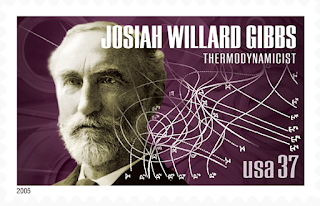Josiah Willard Gibbs (1839-1903) was one of our greatest scientists, yet it's doubtful that one in a thousand Americans recognize his name. His accomplishments: [bold added]
like Newton’s synthesis of celestial and terrestrial physics, Gibbs’s work on thermodynamics unified myriad seemingly unrelated concepts, bequeathing to future generations the challenge of developing each into its own field of study...Thermodynamics hasn't captured the popular imagination like cosmology (the origin and fate of the universe) or astrophysics (which has a lot to say about space travel, black holes, etc.), but perhaps with the resurgence of interest in alternative energy and energy efficiency Willard Gibbs will finally get his due.
Then came On the Equilibrium of Heterogeneous Substances. In this 1878 book-length paper, Gibbs provided what amounted to a unified theory for thermodynamics. Gases, mixtures, surfaces, solids, phase changes, chemical reactions, electrochemical cells, sedimentation, osmosis: Gibbs showed how thermodynamic principles can describe each of these seemingly separate phenomena...
He enshrined his concepts in his second masterpiece, Elementary Principles in Statistical Mechanics Developed with Special Reference to the Rational Foundation of Thermodynamics, published in 1902, a year before his death. Statistical mechanics—a term he invented—was the methodology that would allow chemistry, almost alone among sciences, to make the transition from the classical era of cause and effect to the quantum universe of all probability all the time.

No comments:
Post a Comment